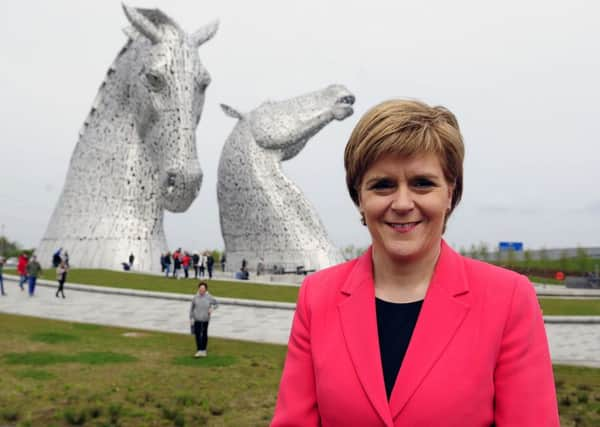Nicola Sturgeon to discuss Brexit vote with EU nationals
This article contains affiliate links. We may earn a small commission on items purchased through this article, but that does not affect our editorial judgement.


The Edinburgh-based financial giant, which employs about 12,000 people, would be “too big” for the economy of a stand-alone Scottish state, according to chief executive Ross McEwan.
The bank had announced plans for a similar relocation in the days leading up to the last independence referendum in 2014 which saw Scots vote to stay in the UK.
Advertisement
Hide AdAdvertisement
Hide AdFirst Minister Nicola Sturgeon has pledged to explore all options to keep Scotland in the EU, and said a second independence referendum is “highly likely”. Scots voted 62 per cent to 38 per cent in favour of the UK staying in the EU in the referendum earlier this summer.
Mr McEwan said RBS would be “too big for the economy” in an independent Scotland and it may have to register elsewhere, but that the move would not affect the 12,000 people who work for the bank. He told the BBC: “We’d have to make the same moves I suspect because the Royal Bank of Scotland, being domiciled in Scotland, would just be too big for the economy, even in the shape that we’re building.
“That’s around the plaque, it’s not about where our people are because we have a very big business up here in Scotland.
“I’ve got 12,000 people who serve both the Scottish people and we also run our retail business from up here along with a lot of our technology.
“Two years ago when we had the Scottish referendum, I made it very clear we’d have the people in the right place, that moving the plaque didn’t make any difference to them.
“I think that would be the same. I think for any country, they just need to remain very competitive so businesses like ourselves want to operate in those countries.”
Asked what he would say to Ms Sturgeon if she wanted his views on the economic impact of a second independence vote, he replied: “Just take account of uncertainty - that’s what you’re seeing after Brexit. It’s uncertainty that slows markets down. Make sure the long game’s worth it. But that’s going to be up to the people of Scotland.”
Advertisement
Hide AdAdvertisement
Hide AdRBS was only saved from collapse at the height of the financial collapse after a UK taxpayer-funded bailout of £45 billion and it remains majority-owned by the Treasury.
But as well as direct investment in the RBS and other failing British banks at the time like Lloyds and Northern Rock, the Treasury also put together a banks rescue package of £500 billion to provide short-term loans and guarantees to help stabilise the financial system.
There are concerns about the ability of an independent Scotland, already faced with a long-term depression on the global oil price crash, to deal with such a shock to the banking system in future.
Other giants such as Bank of Scotland and Standard Life are also headquartered in Edinburgh. Even in the years since the crash, RBS has continued to struggle, racking up losses of more than £50 billion, including the latest £2 billion deficit announced earlier this month.
Some experts have suggested Scotland’s financial services sector could benefit from Scotland’s continuing membership of the EU, providing a new gateway to the European single market for British businesses after the rest of the UK leaves.
A Scottish Government spokeswoman said: “As RBS has made clear, the location of their ‘brass plaque’ will make no difference to jobs in Scotland.
“The uncertainty our economy faces is from Brexit. That’s why our immediate priority is to secure our continued place in the single market and maintaining and strengthening our links with our key European markets.”
Opposition parties in Scotland said Mr McEwan’s comments show the “risk” of holding another referendum on independence.
Advertisement
Hide AdAdvertisement
Hide AdLabour business manager James Kelly said: “This intervention once again makes clear that being part of the UK is good for jobs, business and the economy in Scotland. We don’t need to risk all that with another referendum on independence. Labour committed in our manifesto to vote against a second independence referendum in the lifetime of this Parliament. That position won’t change any time soon.
“We have been pleased to give Nicola Sturgeon our full support to negotiate with the UK Government and EU institutions to find the best deal for the people of Scotland. Two mandates have to be respected - people voted in overwhelming numbers to maintain our relationship with both the EU and the UK. Delivering an outcome that achieves that is critically important.”
Scottish Secretary David Mundell last week accused Ms Sturgeon of maximising uncertainty and damaging prosperity by “touting” a second independence referendum.
The UK cabinet minister insisted there is no mood for another independence referendum north of the border, despite the Brexit result and insisted the added uncertainty in Scotland is “already having an impact” on business.
Ms Sturgeon has established a panel of experts to examine the possibilities for maintaining Scotland’s relations with the EU in the aftermath of the Brexit vote and has pledged to “pursue all possible options to ensure that our voice is heard”. She also recently set out five key tests against which this would be measured, including access to the EU single market and freedom of movement which was at the centre of concerns for many who voted Brexit. Opponents have claimed Ms Sturgeon’s tests have been “set up to fail” which would allow the SNP to hold a second referendum.
DOWNLOAD THE SCOTSMAN APP ON ITUNES OR GOOGLE PLAY